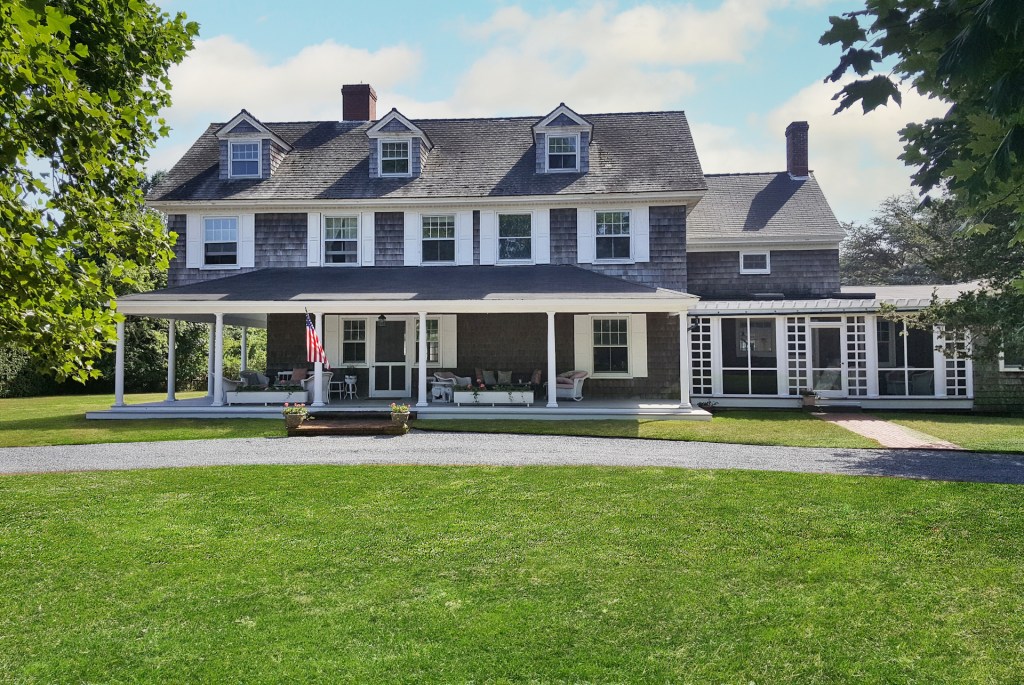Ready, Set, Go: Now Enter the 2017 Dan’s Papers Literary Prize for Nonfiction

Last Thursday at noon in Southampton, I went out the front door of the office of Dan’s Papers, took out my pistol and fired a shot in the air.
Thus the sixth year of the Dan’s Papers Literary Prize for Nonfiction opened for entries. Not with a whimper but a bang, as some author might have written. And not with an act of nonfiction, since my firing that shot in the air is fiction. A metaphor, if you like. Never happened.
The race is on. Authors from around the world will try their hand at winning one of the 12 prizes awarded at the John Drew Theater at Guild Hall of East Hampton on August 31. In the first five years, thousands of people have entered. And that’s not fiction. Entries have to be between 600 and 1,500 words and meaningfully mention eastern Long Island. Six judges read the entries and rate them. First prize gets a trophy and $5,000. There is also an Emerging Young Writers Prize, which authors under 25 may enter, and that winner gets $3,000. In each competition, two runners up get $500 apiece and three others are awarded Judges Choice awards.
We have had a wonderful time running this competition, and we’ve had help from many in this community to make this happen, to encourage writing, to find, perhaps, the next Robert Caro—who is one of the best writers of nonfiction living today. Caro has won two Pulitzer Prizes, for biographies of Robert Moses and Lyndon Johnson. He lives in East Hampton and made the keynote speech at our first awards ceremony, and spoke again last summer for the presentation of the Emerging Young Writers Prize.
One year, Jefferson Lecture honoree Walter Isaacson, the Ben Franklin and Steven Jobs biographer, gave the keynote speech wearing the dusty uniform from the annual Artist-Writers softball game. He left that game in the eighth inning to get to us on time. The award ceremony is at one end of town, the ball game at the other. The mayor had a police car take him over.
Another year, the late National Book Award winner E.L. Doctorow gave the keynote. Another year Carl Bernstein, a Pulitzer Prize winner for his work covering Watergate did; another year it was cartoonist Jules Feiffer—an Oscar and Pulitzer Prize winner—and National Book Award winner Tom Wolfe, who, by the way, wore his handsome white linen suit and carried a wooden cane with a wolf carved into its handle.
Among those giving out awards have been Len Riggio, the Chairman of Barnes & Noble (the major sponsor of this event) and the late author Barbara Goldsmith. Winners were read by media personalities—Emmy winner Pia Lindstrom, Emmy winner Dick Cavett and Oscar-winning actor Mercedes Ruehl.
The Hamptons International Film Festival (HIFF) has helped the awards ceremony. So has the Perlman Music Program on Shelter Island. Caroline Doctorow performed for us one year. A Peter Maxx painting provided the stage backdrop for the awards ceremony. Alec Baldwin, among others, has made donations to the prize. We’ve even awarded a scholarship for a student at the Stony Brook University English Department.
The essays were rated from one to five. Five is the best, one is not-so-good. One year, we had a dead heat for the grand prize, right down to the thousandth of a point. As I have declared myself “referee” of this competition, I decided to call Len Riggio at his office. He was one of the judges that year. I thought it would be fair to let him decide who won. He remembered both entries. He hesitated for a while, then told me which he’d liked best.
“I thought that one, too,” I said.
It’s $4,500 difference between the $5,000 first prize and the $500 second prize.
People have asked me which essays I liked over all these years. A referee doesn’t vote, but there are several I recall that stand out in my mind. We’ve had history, autobiography, memoir, fishing stories, nature stories, reminiscences and surfing reports, but I liked the funny ones. By the way, one of the following did not win a prize, and the other won a runner-up prize.
The first one was written by Fran Castan. She and her husband are residents of Mecox and have visited the East End for over 40 years. They remember the old days.
On this particular occasion, the Castans were visiting a nearby couple for sunset when the husband suggested they take his little Boston Whaler out for a gentle ride in the bay. Half an hour out, as the sun was near the horizon, their engine conked out. They paddled a little and then decided to just tie up at the nearest dock on the other side of the bay and ask the owner of that house to call a taxi to take them home. They’d pick up the boat later. They were barefoot and without wallets or cell phones.
“We approached a house with six separate entrances, resembling those in a row of townhouses. Four sports cars were placed like compass points on a circular driveway. ‘Oh good, someone must be home.’
“I suggested we call out, so as not to surprise anyone, especially a dog. ‘Hell-ooo ooo.’ Through a screen door we saw a plush, but empty, sitting room. We continued to call.
“After 10 minutes, another door opened and a handsome man with white hair, a white moustache and sky-blue eyes appeared…. He was the butler and in just a few minutes Brian would be coming to help us.
“‘Please could you call a taxi for us, so we can get some gas and motor off?’
“‘No, I’m afraid not. You’ll have to wait for Brian.’
“‘We really can’t wait long. Our friend’s wife will worry. She expected us back for lunch half an hour ago.’
“‘Sorry,’ he said, ‘you can’t leave the premises until security has a chance to check you.’
“‘Security? We’re neighbors. We told him our names and our host’s address directly across the cove. We apologized for intruding. All we needed was some gas.
“‘I’m sorry,’ he said quite genuinely. ‘I truly am, but now you’re here and you’ll have to do things our way.’
“Another man—in a business suit, white shirt and tie—raced toward us and demanded ‘who are you and just what are you doing here and how did you get in?’”
As this second man led the intruders down a driveway to an area where they would wait further, the author’s husband noticed something.
“My husband patted his one hip and gestured toward the departing (man). I noticed the bulge. ‘Gun’ my husband whispered.”
* * *
Another story, by Terrence Lane, a young man employed at a tourist destination, began this way:
“Location: Montauk Manor Resort and Condominium. Date: October 31, 2009. Time of incident: 11:09 p.m.”
It’s Halloween, and the manager of this resort has asked all the employees to come to work in costume. Lane comes as a Buddhist Monk. The night receptionist is dressed as Little Bo Peep.
The incident is a phone call from upstairs where a woman has called down to say her husband is drunk and getting violent and please come up to help.
Bo Peep and the monk rush off. The husband is naked from the waist up and passed out on a sofa. But then he awakens. Bo Peep runs to the woman. They call the police.
The author, in his monk suit, tackles the drunk as he comes forward and wrestles him to the ground and sits on him, pinning him to the rug.
“Being on him is like riding a tremendous female leatherback turtle, postpartum, as she makes her instinctive dash for the sea. And he stinks. He smells like Velveeta and armpit. My hand has slipped into that armpit several times and is now already shiny with brine. I hear the cheap material under my own armpit tear away from the greater garment. He’s tiring.”
The cops arrive.
“Thank God. Euphoria washes over me. It feels heroic to be found victorious in the throes of a citizen’s arrest.
The cop shouts: ‘which one is it?’”
The title of this piece is “Monk of the Month.” But I think it would have been better titled “The Monk or the Drunk.”
To enter the 2017 Dan’s Papers Literary Prize for Nonfiction and the Emerging Young Writers Prize, visit LitPrize.DansPapers.com.



